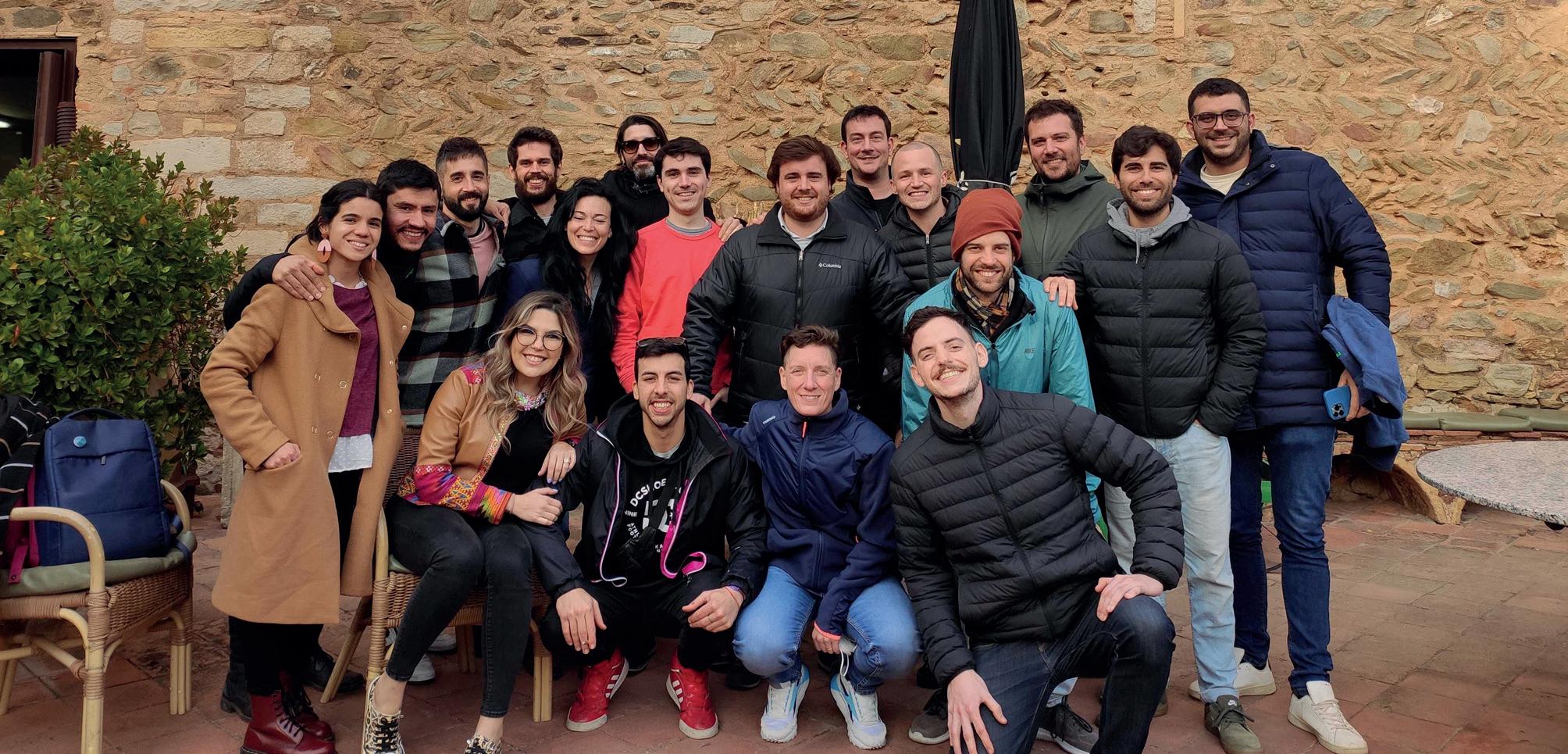
13 minute read
Banesco Banco Múltiple Achieves Excellence Through Digital Transformation
from PAN Finance Magazine Q2 2022
by PFMA
BANKING & INVESTMENT PAN Finance Magazine Q2 2022
Banesco Banco Múltiple is one of the most dynamic financial institutions in the Dominican Republic. Since its early years, it has been offering a wide array of products to thousands of clients across the country. As a result, by the end of the first quarter of 2022, the bank had reached the sum of USD$796 million in assets, USD$397 million in deposits and USD$52 million in equity.
One of the main factors that set Banesco Banco Múltiple apart in the Dominican banking ecosystem is being part of an international corporation that has been present around the world for decades, such as Banesco Internacional. The organisation is integrated by four independent financial groups: Banesco USA, Banesco Panama, Banesco Venezuela, and Banesco Dominican Republic. Its founder, Juan Carlos Escotet Rodríguez, is also the main shareholder of ABANCA, a well-known financial entity based in Spain and regulated by the European Central Bank, which has positioned itself as one of the most profitable in that country. The total assets of Banesco Internacional and ABANCA, added together, are equivalent to more than 98 billion US dollars. With the legacy and support that Banesco Internacional provides, plus the determination and commitment of its staff and the loyalty of its clients, Banesco Banco Múltiple has been able to achieve financial excellence and constant innovation in the Dominican Republic. In fact, it recently became the first bank in the country to enable financial transactions and claims via WhatsApp (the top instant messaging service in the DR) through its virtual assistant DANI, as part of the bank’s ongoing digital transformation process.
BANESCO’S AMBITIOUS DIGITAL TRANSFORMATION PLAN
The bank’s digital transformation began by placing its clients and customers at the centre of all decisions. This means that Banesco did not only consider the economic viability of the process, but also the positive impact it would have on the people who rely on their products and services. Additionally, just like any other transformation process, this one required significant dedication, time, and resources to be able to deliver value in the shortest possible time, while enabling other capabilities for the near future. As part of its transformation, the bank launched the only credit card in the Dominican market that offers 7% cashback every day of the week at popular establishments, such as grocery stores, pharmacies, hair salons, restaurants, and more. This initiative was paired with the introduction of a new and unique bank statement format that allows clients and customers to graphically see the distribution of their expenses, as well as their consumption history and savings to date. Most recently, statements also include cardholders’ credit scores, a feature intended to contribute to their financial education and quality of life.
The digital transformation process of Banesco was also a perfect time for the bank to empathise with its clients and learn more about them. One of those lessons was the fact that they were eager for digital and efficient services that were also human, simple, and easy to use. This understanding of things was the basis for the introduction of new customer service channels, such as WhatsApp, which is a great differentiator asset for the bank in the Dominican market and is a feature that kept evolving from the traditional customer service offered by operators until it became DANI, Banesco’s automated chatbot.
www.panfirnance.net

It should be noted that DANI is such a versatile tool that it allows Banesco’s clients and customers to do numerous things in one place, such as consulting their account balance, request credit card statements, activating and blocking cards, receiving urgent banking assistance, get maps locations and hours of operations of branches, and most recently, making claims and disbursements online in real time from its Multicredito product, which is a unique capability for this channel.
As an alternative digital channel, DANI is now the preferred customer service method of Banesco’s users, which is proven by indicators such as the increase of transactions via WhatsApp by 56% in recent months. Likewise, it was reported that the level of satisfaction among users of the DANI platform was around 92% during the month of March 2022.
Other innovations introduced during the bank’s digital transformation process include its association with the largest ATM network in the Dominican Republic, UNARED, with more than 1,500 ATMs, and with the PAGATODO network of payment offices, enabling more than 600 points of sale. These actions have drastically expanded Banesco’s ability to support its clients and customers when it comes to money withdrawals and payments across the country.
Moreover, Banesco has worked to upgrade its face-to-face channels with a new service model, starting with its Bella Vista Mall branch (located in Santo Domingo), where clients and customers can access an innovative self-service system to check their accounts and cards balances, download statements, and much more, without having to wait in line. This self-service system offers a significant upgrade in comparison to the conventional models of multi-service ATMs that people can find in the country.
The bank also recently relaunched other digital channels its Internet Banking and APP for IOS and Android. These services were fully built to show its clients and customers how much Banesco values their time by offering them modern interfaces that allow them to complete their financial tasks in a few simple steps.
In order to make this transformation possible, Banesco Banco Multiple invested in drastic IT improvements, including the adoption of services in the cloud and API architecture. The bank also invested in customer experience and human talent, to make sure every single member of their staff was ready to provide clients and customers with the best possible service.

According to the bank’s leaders, most of the transformation process of their digital service consisted of making sure users could execute tasks like registering to their online banking platform, resetting a password, adding payees, and making internal or interbank transfers instantly and without friction, in just 2 or 3 steps. This was possible to achieve since Banesco’s online platform is user-friendly and does not require clients to utilise tokens or any physical tools to complete transactions; instead, the system uses other mechanisms such as multifactor and biometric protections to guarantee the highest security.
The bank’s leaders also assured that, while upgrades and transformation processes like the one they recently finalised usually take advantage of technology to optimise procedures and create new services, their main focus during the entire digitalization process was always the human element, with their clients and customers at the centre of it and always ensuring the greatest delivery of value to them.
OUTSTANDING SUPPORT TO DOMINICAN SMES
Banesco Banco Múltiple is also known for caring about Dominican small and medium-sized enterprises, which is why the bank invests heavily in them, providing them with the support they need to succeed and grow. Thanks to these efforts, the financial institution currently has about 1,757 SMEs as clients, all of which praise its personalised customer service, attention to detail, and other benefits like financial education workshops and talks with industry experts.
In terms of products and services, SMEs at Banesco can benefit from checking accounts, with or without interests; commercial savings accounts, in Dominican pesos and US dollars; business loans, secured and unsecured; and other financial tools like construction loans, financial certificates, lines of credit, and “green” loans, which are dedicated to sustainable endeavours.
Banesco’s support for SMEs as an important pillar of the national economy is very comprehensive. An example of this is how in 2021, due to the COVID-19 pandemic, the bank signed an agreement with Groupe Agence Française de Développement (PROPARCO), an investment subsidiary in the private sector of the French Development Agency (AFD), for an amount of US$15 million dollars to be destined to the financing and development of the portfolio of Dominican SMEs. The previous year, in 2020, the bank signed a collaboration agreement with the Dutch financial institution FMO for US$12 million for the same purpose, just to name a few of its actions in this regard.
Furthermore, in line with its goal to support SMEs, Banesco is carrying out several Corporate Social Responsibility (CSR) initiatives, as they consider this to be essential to its operations. As part of these actions, also in 2021, the bank brought to the country, free of charge, the fourth edition of the 2021 SME Tour Conference, the most important event held in all of Latin America exclusively for business owners and managers of this sector.
Similarly, the bank remains close with SMEs through its “Conexión PYMES” platform, focused on educational content and talks, and looking to enhance the skills of managers and staff in small and medium-sized companies in the Dominican Republic. This gives them access to a selection of current and trendy topics discussed by subject matter experts. Some of the topics that we have presented in the past include “Reorientation of marketing, advertising, and strategic communication”, “The reinvention of SMEs, journey through different countries”, “Resilient businesses in the face of the new normal”, and “From entrepreneur to businessman.”
BANKING & INVESTMENT PAN Finance Magazine Q2 2022

Danny Bradlow
SARCHI Professor of International Development Law and African Economic Relations, University of Pretoria
Magalie Masamba
Post-doctoral Fellow, Centre for Human Rights, University of Pretoria
Three priorities Africa’s newbie on the World Bank board should focus on
President Cyril Ramaphosa recently appointed a senior South African politician, Ayanda Dlodlo, to serve a two-year term as a member of the World Bank’s 25-person Board of executive directors. She will represent a constituency consisting of Angola, Nigeria and South Africa.
Dlodlo has previously held two cabinet positions – as minister of public service and administration and state security.
The appointment of such a senior politician to executive director position offers South Africa an opportunity to influence the World Bank’s relations with Africa.
The 25 executive directors of the bank fulfil a dual function. Firstly, they operate as the governing board of the World Bank. Their second function is to represent the interests of their countries at the bank. THE ROLE
Executive directors must approve all World Bank loans and guarantees, country assistance strategies, the administrative budget of the Bank, and the Bank’s key operational policies and procedures. They also monitor the management and staff of the Bank compliance with these policies.
In all these activities, the board has a fiduciary responsibility to act in the best interests of the World Bank.
Their second function is to represent the interests of the countries in their constituency. This inevitably means that the Board is a more political board than the board of most banks.
In an effort to mitigate its politicisation, the board has developed the custom of operating largely by consensus. Formal votes by the board are unusual. This is significant for two reasons. First, World Bank member states have weighted votes, with their votes being weighted according to a formula based on their economic size and role in the global economy. Each executive director has a vote equal to the sum of the votes of the states in their constituency. Thus, a minority of powerful executive directors, with large weighted votes, can outvote the majority of the board.
China, France, Germany, Japan, Saudi Arabia, the UK and the US are each represented by their own executive director. These seven executive directors have over 50% of the total vote in the Bank. The remaining 182 World Bank member states belong to constituencies each of which is represented by one executive director.
Second, the practice of consensus means that any executive director that earns the respect of their colleagues can become an influential
www.panfirnance.net

voice in the board’s decision-making process regardless of their constituency’s vote.
The constituency that Dlodlo will represent is particularly small. It was created in 2010 when the World Bank approved a resolution increasing the number of elected executive directors from 24 to 25. This decision followed a concerted campaign by African states and their allies, in which South Africa played a leading role, to improve the voice of African states in the governance of the Bank.
This reform demonstrates the role that South Africa can play in advancing the interests of African countries at the bank.
PRIORITIES
Dlodlo’s first priority should be to advocate for improved support for Africa. World Bank support is a matter of both the quantity of funds and its quality.
Dlodlo and her fellow African executive directors therefore need to take a pronged approach.
Firstly, they should argue, that the Bank should increase the level of financial support that it provides to Africa so that it can deal with the adverse economic effects of the war in Ukraine. The war is leading to increased prices in goods like food and fertiliser for which certain African countries are heavily dependent on Russia and Ukraine.
Second, they should advocate that the financing should be provided in a form that allows African countries the maximum possible flexibility in how they can use the funds. In particular, the terms of the financing should help countries promote their own agenda for dealing with the challenges that they face in promoting sustainable and inclusive development.
This means that the support should be focused on helping governments and communities use the funds consistently with the international norms and standards they’ve signed up to. These include the sustainable development goals, the declaration on the right to development and the core human rights treaties.
Secondly, Africa’s representatives on the World Bank board should advocate for a more creative and sustainable approach to Africa’s looming debt crisis. either in debt distress or at high risk of debt distress. The international community’s response has been tepid. The Debt Service Suspension Initiative which provided temporary debt repayment standstills has ended. While many eligible African countries took advantage of it, they received limited support. It is also becoming evident – as acknowledged by the World Bank President – that the Common Framework for Debt Treatments beyond the initiative has serious shortcomings.
This suggests that there is a need for new approaches. The World Bank is one forum in which to organise more creative and sustainable avenues to dealing with African debtors in distress. For example, Africa’s executive directors could advocate that the World Bank support efforts to hold all Africa’s creditors, including its bondholders, to the applicable international norms and standards.
The third area in which Africa’s executive directors can play a role is in promoting a more accountable and responsive bank.
Over the last three decades the World Bank has been a leader in promoting more transparent and accountable development finance. But there are still shortcomings in its approach to it’s own accountability for compliance with its operational policies.
A substantial cause of these problems is the failure of the Bank management and staff to treat accountability as part of the learning process at the Bank rather than as a means for assigning blame. This is unfortunate because development projects are inherently complex and uncertain. Even the best and most committed development practitioners are likely to make mistakes. They therefore need to have a means of identifying and learning from these mistakes. They also need to learn about these mistakes expeditiously so that they can take action before their unintended mistakes have irreversible adverse social and environmental impacts.
Communities are both an important source of information on these problems and the unfortunate victims of their effects. Consequently, an independent mechanism that allows these actors to raise their concerns and get them addressed in a timely and effective manner is a necessary element in the development process. It also offers the World Bank a unique and essential perspective on the impacts of its operations.
The Bank created the Inspection Panel, its own independent accountability mechanism in 1993. In 2020 the executive directors created an expanded mechanism, the Accountability Mechanism to investigate complaints from external stakeholders that they have been harmed by the management and staff’s failure to comply with these policies.
Dlodlo should use her position to help change the Bank’s general approach to accountability so that it is more open to admitting its mistakes, correcting them and learning from them.







